Gold Supporter
Bronze Supporter
- Messages
- 12,973
- Reactions
- 47,331
I got my first real operational experience this past weekend in support of the Mountain Lakes 100 event. If a regular marathon isn't worth your time and and ultramarathon is not enough of a challenge you can run 100 miles of mountain trails between Olallie and Timothy Lake and back. Race details are here: Mountain Lakes 100
I recently joined a local amateur radio club that provides communication support for several outdoor events and was offered an opportunity to work with another club member at one of the aid stations. Since we were posted in the clubs trailer one of our duties was to act as Net Control for most of the event. Our shift was long lasting from 4:00 PM Saturday through 7:30 AM Sunday, but was still a lot of fun and very rewarding.
All I can say is that this was one heck of a great learning experience, and not just about communications operations. To start with these type of ultra marathons have been around for quite a while and are increasing in popularity. Also, there are 200 mile races that take place over five days. One of which is around Mt. St. Helens.
We spent quite a lot of time working with Karen, who oversaw operations at our aid station, so I asked her some questions about the runners and got some surprising answers. The first is that the average age of the runners is around 40. Let that sink in a bit. The oldest runner was 61 and almost completed the course. The oldest runner who did complete was 59. Both of these were women as were a healthy percentage of the runners. Of the 160+ runners who started over 140 completed the race. There was a higher dropout rate this year because a fair amount of the race involved running through the snow. I think it's time that the phrase "runs like a girl" is put to rest.
Our station, one of 11, was called the Clackamas Ranger Station, even though it never was one - it's actually the site of the Clackamas Lake Historic cabin,marked AS 9/12 on the map, making it the 9th stop as runners went north, and then the 12th stop after turning around and heading back south to Olalli Lake.

Here is the runners entrance to Clackamas Ranger Station, you can see our antenna poking out just to the left of the white canopy in the foreground (the timekeeping station):

Here is a picture of our trailer with Paul, who is the Secretary Treasurer of our club

And a picture of Rich, who patiently taught me the ropes. Note the hand blur as he went for yet another face palm:

A view of the comms we used for this event, we used a pair of Yaesu FTM-400DR transceivers. The one of the left was the active unit and the one on the right was a backup. The papers are covering the damage that Rich did banging his head on the desk when I took control the first time:

A view of the food station, warming tent (in the middle), and the First Aid station. They must have served hundreds of pounds of bacon and waffles and countless amounts of coffee during the event, finally closing up at 5:00 AM this morning:

Giving information radioed in from another station to Jim the timekeeper, left, with the gent who manned communications at the turnaround point (AS10/The Dam) on the right.:

Coordinating with the Med Techs to get aid sent to injured runners. Aid Station manager Karen is the lady in the blue coat in the food station behind them. Everybody was terrific to work with!:

I didn't manage to get any photos of the runners coming through because they were running so fast I didn't have time for my camera to turn on between the time we heard cheers and horns and when they blew past without stopping.
I recently joined a local amateur radio club that provides communication support for several outdoor events and was offered an opportunity to work with another club member at one of the aid stations. Since we were posted in the clubs trailer one of our duties was to act as Net Control for most of the event. Our shift was long lasting from 4:00 PM Saturday through 7:30 AM Sunday, but was still a lot of fun and very rewarding.
All I can say is that this was one heck of a great learning experience, and not just about communications operations. To start with these type of ultra marathons have been around for quite a while and are increasing in popularity. Also, there are 200 mile races that take place over five days. One of which is around Mt. St. Helens.
We spent quite a lot of time working with Karen, who oversaw operations at our aid station, so I asked her some questions about the runners and got some surprising answers. The first is that the average age of the runners is around 40. Let that sink in a bit. The oldest runner was 61 and almost completed the course. The oldest runner who did complete was 59. Both of these were women as were a healthy percentage of the runners. Of the 160+ runners who started over 140 completed the race. There was a higher dropout rate this year because a fair amount of the race involved running through the snow. I think it's time that the phrase "runs like a girl" is put to rest.
Our station, one of 11, was called the Clackamas Ranger Station, even though it never was one - it's actually the site of the Clackamas Lake Historic cabin,marked AS 9/12 on the map, making it the 9th stop as runners went north, and then the 12th stop after turning around and heading back south to Olalli Lake.
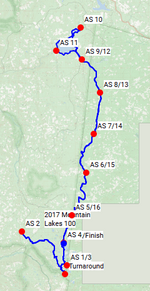
Here is the runners entrance to Clackamas Ranger Station, you can see our antenna poking out just to the left of the white canopy in the foreground (the timekeeping station):
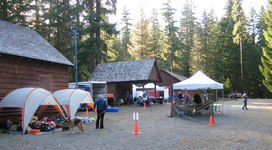
Here is a picture of our trailer with Paul, who is the Secretary Treasurer of our club
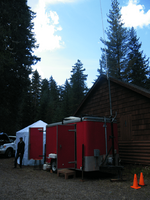
And a picture of Rich, who patiently taught me the ropes. Note the hand blur as he went for yet another face palm:
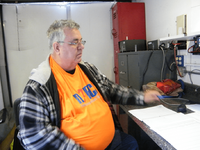
A view of the comms we used for this event, we used a pair of Yaesu FTM-400DR transceivers. The one of the left was the active unit and the one on the right was a backup. The papers are covering the damage that Rich did banging his head on the desk when I took control the first time:

A view of the food station, warming tent (in the middle), and the First Aid station. They must have served hundreds of pounds of bacon and waffles and countless amounts of coffee during the event, finally closing up at 5:00 AM this morning:
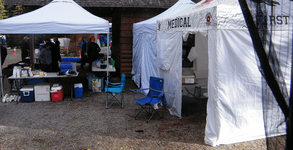
Giving information radioed in from another station to Jim the timekeeper, left, with the gent who manned communications at the turnaround point (AS10/The Dam) on the right.:
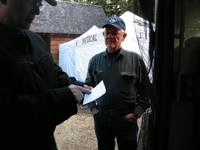
Coordinating with the Med Techs to get aid sent to injured runners. Aid Station manager Karen is the lady in the blue coat in the food station behind them. Everybody was terrific to work with!:
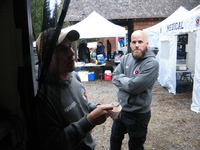
I didn't manage to get any photos of the runners coming through because they were running so fast I didn't have time for my camera to turn on between the time we heard cheers and horns and when they blew past without stopping.
Last Edited:











